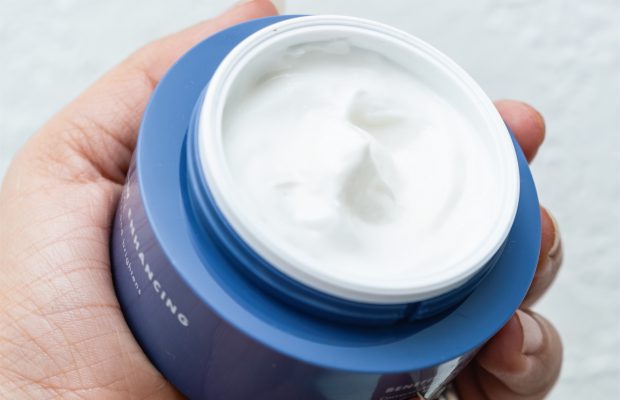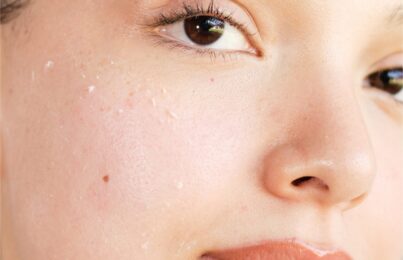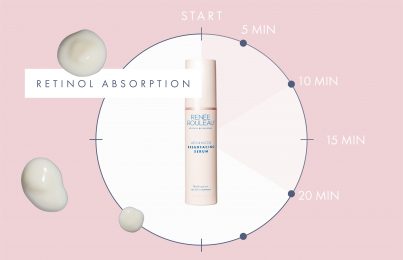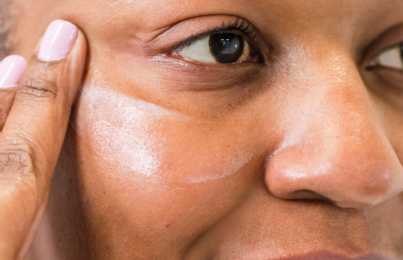Updated 07/11/23. People often ask me, “Should I occasionally skip moisturizer at night to give my skin a break?” My answer is always the same. No, you should never avoid using moisturizer in an effort to give your skin a break or let your skin “breathe.” In this post, I’ll explain why the consistent use of nighttime moisturizer is critical for hydrated, healthy-looking skin—no matter your skin type!
5 Reasons You Should Never Skip Nighttime Moisturizer
1. The Idea That Your Skin “Breathes” Is a Myth
Your skin doesn’t perform the function of respiration, so the idea that your skin can “breathe” is false. I realize that the word “breathe” means different things to different people, and I’m using it in the literal sense. When some people talk about skin breathing, they’re actually referring to whether or not the skin is occluded, meaning they don’t want something blocking their pores. In this case, use a lightweight moisturizer. It’s all about choosing the right moisturizer for your skin type (but more on that in a second).
2. Skin Cells Need Moisture to Live
I always say that skin cells are like fish in that they need water to survive. Without water, skin cells become dehydrated and the overall health of the skin is severely compromised. In fact, dehydration can set off a response that leads to irritation, redness, and sensitivity. The consistent use of moisturizer is an efficient way to boost water levels in the skin.
3. Oil Production Is Lowest at Night
Oil, or sebum, is the natural substance the body produces to moisturize the skin. Sebum levels fluctuate at 8-hour increments. They’re highest in the early afternoon and lowest at night. When your skin is lacking sebum, the rate of transepidermal water loss increases, which disrupts your moisture barrier. When the moisture barrier is disrupted, it can lead to all sorts of issues, including redness, tightness, itchiness, flaking, and atopic dermatitis. A good nighttime moisturizer can provide much-needed moisture to support the barrier and prevent transepidermal water loss.
4. The Best Time to Use Active Ingredients Is at Night
At night, your body goes into repair mode. Using active ingredients such as retinol, exfoliating acids, and antioxidants can support the skin’s natural cellular repair and turnover processes. Plus, if you’re getting the recommended eight hours of sleep per night, you’re allowing these active ingredients plenty of time to penetrate the skin for maximum efficacy.
5. Skin Permeability Is Highest at Night
Yes, you read that right. Skin permeability changes according to your skin’s circadian rhythm (yes, your skin has a circadian rhythm just like you! Learn more about it in this post). Its permeability is highest in the evening, which means a moisturizer can penetrate deeper into the skin at night than it can during the day.
How to Choose the Best Nighttime Moisturizer
Here are some guidelines to follow when choosing a nighttime moisturizer for your skin.
Select a Moisturizer Based on Your Skin Type
Choosing a nighttime moisturizer for the basic skin types—dry, normal, and oily—won’t get you very far, especially if you have additional skin concerns such as clogged pores, breakouts, or rosacea. Instead, you have to look at your skin as a whole.
For example, if you have oily skin, severe breakouts, and clogged pores all over, you might be a Skin Type 1. In that case, you can benefit from a lightweight gel moisturizer like the Daily Mattifying Solution. However, if you have dry, sun-damaged, and aging skin, you might be a Skin Type 8. In that case, you can benefit from a thicker moisturizer that contains brightening ingredients, like the Glow Enhancing Creme.
If you don’t know your Renée Rouleau Skin Type, don’t worry. Take the Skin Type Quiz to find out. At the end of it, you’ll get personalized product recommendations. I developed it to take the guesswork out of creating an effective skincare routine.
Avoid Using a Nighttime Moisturizer that Contains Sunscreen
Some people use the same moisturizer both morning and night. If you’re one of these people, and your moisturizer has sunscreen in it, it’s not going to get your very far while you sleep. Your skin’s needs are different at night than they are during the day, so you need to use the correct ingredients.
Typically, moisturizers that contain sunscreen don’t contain the same active ingredients that other nighttime moisturizers do, which means it’s not doing as much to assist with your skin’s natural reparative processes. Plus, your skin simply doesn’t need SPF at night, so you’re essentially wasting product you could use during the day.
Don’t Be Afraid of Oil In a Moisturizer
If you have an oily skin type, and you see an ingredient with the word “oil” in it, you might hesitate to use it. It’s important to know that virtually all creams and lotions use some form of oil or emollient to make the product slip across the skin. Also, not all oils are comedogenic (pore-clogging).
This is the same reason why moisturizers don’t directly cause breakouts. Breakouts occur when the cells that line the inner pores fail to shed properly, causing the pore to become clogged. This happens whether or not you use oil-free products. Ultimately, choosing the right products for your skin type is what will guarantee the best results.
The Bottom Line
You should never avoid using moisturizer at night. It won’t solve any issues. In fact, it could cause issues! After all, your skin needs moisture and protection at night, too.
Just be sure to always cleanse your skin before applying moisturizer. I know it’s the end of the day and you’re tired, but you really need to trust me on this one. Your skin needs tending to. You have a day’s worth of oil, dirt, bacteria, and makeup (and who knows what else) on your face. Removing it all before applying your moisturizer is essential.
Next, these 10 nighttime skincare tips make a big difference.
Celebrity Esthetician & Skincare Expert
As an esthetician trained in cosmetic chemistry, Renée Rouleau has spent 30 years researching skin, educating her audience, and building an award-winning line of products. Her hands-on experience as an esthetician and trusted skin care expert has created a real-world solution — products that are formulated for nine different types of skin so your face will get exactly what it needs to look and feel its best. Trusted by celebrities, editors, bloggers, and skincare obsessives around the globe, her vast real-world knowledge and constant research are why Marie Claire calls her “the most passionate skin practitioner we know.”




Comments:
Your writing is well-written and engaging. Could you please clarify whether it is appropriate to use the same moisturizing cream for both morning and evening skincare routines or to utilize different moisturizers tailored to specific climate conditions and skin types?
Posted By: Vilvah |
thank you for the info.. also liked the css of the website 🙂
Posted By: ananya |
Suggest best moisturizer for oily skin to put in night?!
Posted By: Chirag |
I recommend taking the quiz to find out which moisturizer is best for your skin type. However, the most loved moisturizer for oily skin from my line is the Skin Recovery Lotion!😊
Posted By: Ella Stevenson |
Thank you for your information! Just to mention: Those of us who have CPAP machines can not wear serums or moisturizers at night. (And no, I am not fat/overweight. Sleep Apnea does not discriminate.) Anyway, I try to do this during the day instead, but find it challenging with makeup. Too much “stuff” on the face and I look to oily and/or foundation slides off.
Posted By: Malika |